Related Research Articles
Agroecology is an academic discipline that studies ecological processes applied to agricultural production systems. Bringing ecological principles to bear can suggest new management approaches in agroecosystems. The term can refer to a science, a movement, or an agricultural practice. Agroecologists study a variety of agroecosystems. The field of agroecology is not associated with any one particular method of farming, whether it be organic, regenerative, integrated, or industrial, intensive or extensive, although some use the name specifically for alternative agriculture.
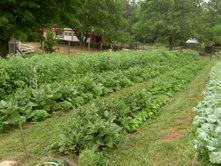
Agroecosystems are the ecosystems supporting the food production systems in farms and gardens. As the name implies, at the core of an agroecosystem lies the human activity of agriculture. As such they are the basic unit of study in Agroecology, and Regenerative Agriculture using ecological approaches.

Landscape ecology is the science of studying and improving relationships between ecological processes in the environment and particular ecosystems. This is done within a variety of landscape scales, development spatial patterns, and organizational levels of research and policy. Concisely, landscape ecology can be described as the science of "landscape diversity" as the synergetic result of biodiversity and geodiversity.
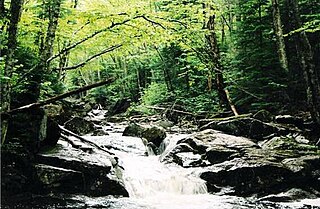
Ecosystem ecology is the integrated study of living (biotic) and non-living (abiotic) components of ecosystems and their interactions within an ecosystem framework. This science examines how ecosystems work and relates this to their components such as chemicals, bedrock, soil, plants, and animals.

Restoration ecology is the scientific study supporting the practice of ecological restoration, which is the practice of renewing and restoring degraded, damaged, or destroyed ecosystems and habitats in the environment by active human interruption and action. Effective restoration requires an explicit goal or policy, preferably an unambiguous one that is articulated, accepted, and codified. Restoration goals reflect societal choices from among competing policy priorities, but extracting such goals is typically contentious and politically challenging.
Thomas W. Swetnam is Regents' Professor Emeritus of Dendrochronology at the University of Arizona, studying disturbances of forest ecosystems across temporal and spatial scales. He served as the Director of the Laboratory of Tree-Ring Research from 2000 to 2015.
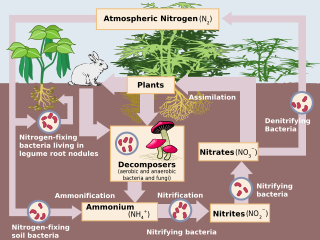
Human impact on the nitrogen cycle is diverse. Agricultural and industrial nitrogen (N) inputs to the environment currently exceed inputs from natural N fixation. As a consequence of anthropogenic inputs, the global nitrogen cycle (Fig. 1) has been significantly altered over the past century. Global atmospheric nitrous oxide (N2O) mole fractions have increased from a pre-industrial value of ~270 nmol/mol to ~319 nmol/mol in 2005. Human activities account for over one-third of N2O emissions, most of which are due to the agricultural sector. This article is intended to give a brief review of the history of anthropogenic N inputs, and reported impacts of nitrogen inputs on selected terrestrial and aquatic ecosystems.
James J. Kay was an ecological scientist and policy-maker. He was a respected physicist best known for his theoretical work on complexity and thermodynamics.
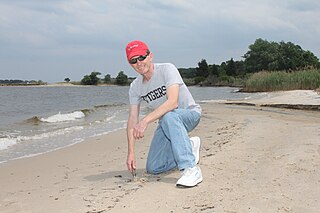
Michael J. Kennish is an American marine scientist and a research professor in the Institute of Marine and Coastal Sciences at Rutgers University in New Brunswick, New Jersey. He is best known for his work on the effects of human activities on estuarine and marine environments.

David John Beerling is the Director of the Leverhulme Centre for Climate change mitigation and Sorby Professor of Natural Sciences in the Department of Animal and Plant Sciences (APS) at the University of Sheffield, UK. He is also Editor-in-Chief of the Royal Society journal Biology Letters.
Aaron M. Ellison is an ecologist, photographer, sculptor, and writer. He retired in July 2021 after 20 years as the senior research fellow in ecology at Harvard University and as a Senior Ecologist at the Harvard Forest. He also served as deputy director of the Harvard Forest from 2018 to 2021. Until 2018, he also was an adjunct research professor at the University of Massachusetts in the Departments of Biology and Environmental Conservation. Ellison has both authored and co-authored numerous scientific papers, books, book reviews and software reviews. For more than 30 years, Ellison has studied food-web dynamics and community ecology of wetlands and forests; the evolutionary ecology of carnivorous plants; the responses of plants and ants to global climate change; application of Bayesian statistical inference to ecological research and environmental decision-making; and the critical reaction of Ecology to Modernism. In 2012 he was elected a fellow of the Ecological Society of America. He was the editor-in-chief of Ecological Monographs from 2008 to 2015, was a senior editor of Methods in Ecology and Evolution from 2018-2021, and since 2021 has been the executive editor of Methods in Ecology and Evolution.
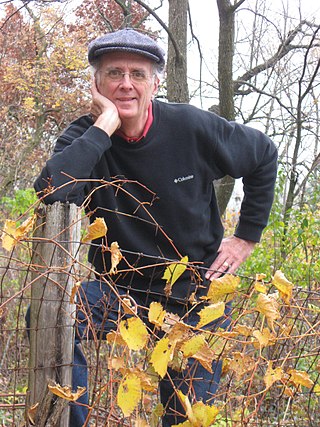
Bill Jordan, more formally William R. Jordan III, is an American botanist and journalist who has played a leading role in the development and critique of ecological restoration as a means of developing an environmentalism that is philosophically more coherent, psychologically more productive, politically more robust, and ecologically more effective. His critique has had a significant influence on environmentalism in the United States and abroad.
John Jeffrey Ewel is an emeritus professor and tropical succession researcher in the department of biology at the University of Florida. Most of his research was conducted through experimental trials to understand ecosystem processes in terrestrial and tropical environments. The results of the research provided the ability to further comprehend forest structure and management, as well as its nutrient dynamics. The primary research conducted dealt with the beginning stages of the regrowth and recovery following agriculture practices. Ewel also participated in studies regarding invasive species and restoration ecology.

Ivette Perfecto is an ecologist and professor at the University of Michigan. Her work focuses on complex ecosystem dynamics and the application of ecological theories to agricultural systems.
Christine Goodale is an ecosystem ecologist and an Associate Professor in the Department of Ecology and Evolutionary Biology at Cornell University. Goodale conducts research that studies the cycling of water, carbon, nitrogen and other nutrients through forest ecosystems.
Susan G. Conard is an American scientist whose expertise focuses on wildland fires in Northern California and Taiga. During the 1980s and 1990s, Conard worked as a research and project leader for the United States Forest Service, publishing pieces on fire management and carbon sequestration. She is currently the editor for the International Journal of Wildland Fire.
Jeannine Cavender-Bares is a Distinguished McKnight University Professor at the University of Minnesota in the Department of Ecology, Evolution & Behavior. Her research integrates evolutionary biology, ecology, and physiology by studying the functional traits of plants, with a particular focus on oaks.
Jiquan Chen is a landscape ecologist, primarily focused on nutrient flux, carbon cycling, bioenergy, and grassland ecology. He currently leads the LEES lab at Michigan State University.
Yude Pan is a senior research scientist with the Climate, Fire, and Carbon Cycle Sciences group of the Northern Research Station, USDA Forest Service, and a senior investigator of the Harvard Forest at Harvard University. Her work is in the fields of Ecosystem ecology and Global Change Biology. She studies terrestrial ecosystems and how environmental stressors affect complex interactions within those ecosystems. Much of her research focuses on forest ecosystems and how they relate to the carbon cycle as a whole, as well as forecasting complex effects of land use, climate change and air pollution on forest ecosystems.
Serita D. Frey is an American academic and ecologist, who serves as Professor of Environmental Science at the University of New Hampshire. Her research considers how human activities impact terrestrial ecosystems.
References
- ↑ "John Aber Awarded University Professorship", UNH Campus Journal, April 22, 2009, retrieved February 19, 2015
- 1 2 "John D. Aber in the University of New Hampshire" . Retrieved February 17, 2015.
- 1 2 "John D. Aber in the University of New Hampshire Department of Natural Resources & the Environment" . Retrieved February 17, 2015.
- ↑ "Yale University Graduate School to honor four alumni". October 5, 2010. Retrieved February 18, 2015.
- 1 2 3 "Good Reads" . Retrieved February 18, 2015.
- ↑ "Forests in Time" . Retrieved 18 February 2015.